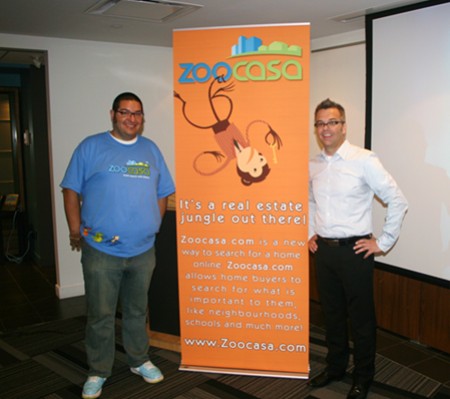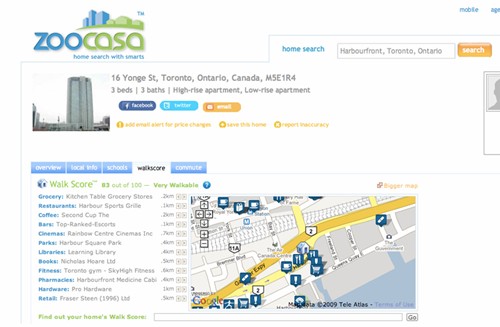Location, location, location – that’s what a lot of home buyers would say when asked what three factors most influence their choice of a property.
The challenge, though, is MLS listings today – while describing the specs of homes – typically provide very little location information.
They offer few details about area schools, proximity to public transit, shops and stores, parks in the vicinity – and other neighbourhood data that helps home buyers make more informed choices.
READ RELATED STORIES
New Web site simplifies online hunt for boxing day bargains
Complete guide to search engine marketing — key to your online success
Zoocasa.com – a novel search tool for real estate listings that launched last week at the Rogers Centre in Toronto – seeks to remedy that.
SEE VIDEO – Smart home searches with Zoocasa
Know thy neighbourhood
Zoocasa is being funded by Rogers Communications Inc. and the idea for such a service sprung up within Rogers, company execs say.
The goal of the site, they say, is to create a savvier, more educated real estate consumer.
To that end, the interface has been designed to simplify property searches, said Butch Langlois, general manager of Zoocasa.com.
For the very first time, he said, potential home buyers can search by neighbourhood.
For instance, they could type in Harbourfront, Toronto to find a list of available properties in that area plotted on a Google map.
It’s the associated background information for each of the listed properties that distinguishes Zoocasa.com from anything else out there, Langlois said.
And this contextual data could be immensely useful to folk searching for a home in an area they’re entirely unfamiliar with, he said.
“Imagine you live in Toronto and are moving to Edmonton, but know nothing about that city. Wouldn’t it be useful to find out in advance what certain neighbourhoods are like?”
He said information available on Zoocasa.com helps home buyers do precisely that. It gives them a deeper understanding of the demographic profile of a neighbourhood.

L to R – Saul Colt, head of magic and Butch Langlois, general manager, Zoocasa.com
“It will tell you, for instance, if there are any Starbucks locations, which says something about a locality … that it’s up and coming.”
Such neighborhood data deeply influences people’s buying decisions, said another Zoocasa.com executive.
“People don’t buy a home just because it has four bedrooms and three bathrooms,” said Saul Colt, head of magic (no kidding, that is his title) at Zoocasa.com.
“They decide to buy a certain home because it has four beds/three baths – and it is close to a certain school or park, and the neighborhood matches their lifestyle,” he said.
By offering up all this contextual information, I like to think of Zoocasa.com as displaying not just houses – but homes.”
In this context, Colt described Zoocasa.com’s Search by School feature as “one of the real jewels” of the new site.
Finding your neighbourhood’s walk score
“This is a new concept but very much in demand, as research tells us more people make their decisions based on this criterion, and some of them aren’t even parents.”
At the launch, Colt demoed how the Search by School feature works.
He popped a listing at 16 Yonge Street, and clicked the school search tab.
A red icon on the map indicated the school associated with that listing (Island Public/Natural Science Junior School).

A red icon indicates a school associated with a listing
Area schools are also given a ranking.
Right now, Zoocasa offers Fraser Institute school data. But Colt said towards the year end, the site would be launching its own school ranking system, and offering proprietary school data. “We’ve done exhaustive work collecting all that data.”
Apart from school data, users can click on other tabs – overview, local info, walk score and commute – to get a broad range of neighbourhood information about a listing.
The walk score app – available for areas across North America – uses an algorithm and Google map data to score the “walkability” of a particular address.

You can check the “walkability score” of an area
For instance, the listing at 16 Yonge St gets a walk score of 83 out of 100 – this means the surrounding area is “Very Walkable.”
Apart from extensive neighbourhood information, the site provides other capabilities. “We enable you to save searches and notify you by e-mail if new homes pop up that you may be interested in,” Colt noted. “As far as I know, these things aren’t readily available anywhere else.”
One click connection with realtors
And a real showpiece of Zoocasa.ca service, the exec says, is its free iPhone application.
“It’s one of the coolest iPhone apps available for a real estate site, and the new version — coming out in a few days — is even better than the current one.”
You can search for a location or use the GPS capability on your iPhone to pin-point your current location – and the Zoocasa app would show you all the listed homes for that area.
After checking out the neighbourhood data for a listing, the application allows you to call or e-mail the realtor from your phone.
“We want to be the realtor’s best friend,” said Colt. “So once you find the information you’re looking for we push you right over to the source of the data – the realtor to arrange a viewing.”
Future features
Upcoming features on Zoocasa.com include:
- An enhanced commute guide – Commute time is often a key factor influencing the home-buying decision, Langlois noted. “Today, if you click the commute tab for any listing, it will give you an estimate of what gas would cost you in a month, based on the commute.” He said a future enhanced version of this feature will enable users to shortlist properties based on commute time. “For instance, if you work in Toronto and want my commute to be 20 minutes or 30 minutes, you will know what neighbourhoods you should rule out, what neighbourhoods should investigate further.”
- An “open-house” guide – This feature, which will also be available via the iPhone app, will quickly let users know about any open houses being held in an area.
There are currently around 100,000 listings on Zoocasa.ca. Brokers and agents can put up their listings for free.
“We get a lot of our listings data from the personal Web sites of real estate agents and brokers, who give us permission to use this information,” Colt said.
One of these brokers is George O’Neill, real estate agent and broker with Royal Le Page Realty, who operates in The Beaches area in Toronto.
By helping create savvier, more informed real estate consumers, O’Neill said, a service like Zoocasa could simplify and enhance the interaction between potential home buyers and realtors.
He cited a recent study by the California Association of Realtors (CAR) that found, people looking for real estate take 16 weeks, on average, to contact an agent.
“It that time they’re trying to determine, not just of what properties they’d want to buy, but also what kind of agent to work with.”
A service like Zoocasa, he said, may shorten the time it takes potential buyers to contact realtors.
“And by the time they do contact the agent, they’ll just be much more informed, and much more focused – so it’s likely be a better experience for everybody all around.”
Research done by Zoocasa last October seems to support this view.
“It clearly indicates that people are beginning to search for real estate online, even before they think of making contact with brokers or agents,” Langlois said.
“It’s a window of opportunity, a niche that we want to fit ourselves in.”
Business model
From the real estate agents perspective, the chief value of the Zoocasa service is the leads it provides (apart from helping create a more informed and focused home buyer).
Zoocasa, Langlois says, is able to tell how many Zoocasa users have looked at an agent’s listings and clicked through to establish contact. “On the iPhone it’s even more immediate — you can look at a listing and immediately call a realtor.”
But he said the service doesn’t charge for leads.
“Our revenues are drawn from advertising on the site.”
He said agents can promote themselves on the site at various levels. To prospective buyers, looking for a property at the Harbourfront, for example, realtors could position themselves as experts in that area. Or else they could promote themselves at the neighbourhood and city level.”
“Then there’s advertising. But everything we offer the agents in terms of listings and leads is completely free.”




